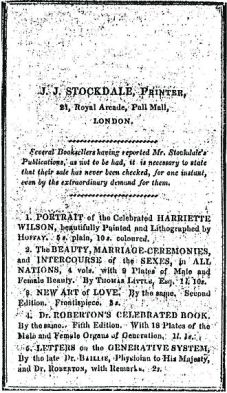14th April 1840. Victory for Free Comment.
Today in 1840 the Royal Assent was granted to the Parliamentary Papers Act reversing the Act of the previous year.(1)
It resulted from the 1839 Stockdale v Hansard case where it was held that The House of Commons enjoyed no privilege as to publications under its authority beyond that held by MPs, and that this did not extend to papers issued outside to the general public.
The Parliament of the UK made an unusual challenge after the 1839 Act concerning the Law of Parliamentary Privilege when it was judged that: ‘Parliamentary privilege does not cloak parliamentary publication with any form of protection’. The next year the judgement was reversed.
The court cases stemmed back to the Prison Act 1835 which introduced the first National Prison System in the UK along with inspectors, one of whom was Whitworth Russell.
It was at Newgate Prison that Russell and William Crawford discovered a well-thumbed edition of John Roberton’s book on Diseases of the Generative System (1811), edited by Thomas Little, the pseudonym of pornographic publisher, John Joseph Stockwell, which had attracted distaste on its publication. for its explicit material.
In 1836 the Parliamentary Reporter, Hansard, printed by order of the Commons, a report prepared by the Inspector of Prisons, which said the book on anatomy in Newgate Library was ‘indecent and obscene’.
The comments were widely reported which spurred Stockwell to action after the Aldermen of City of London, regarded the book as ‘scientific’, despite the Inspectors fulminations, and sued Hansard in 1837.(2)
However paradoxically Lord Denman dismissed the defence of Parliamentary Privilege, but the Jury found for Hansard [and its comments]. Stockdale was understandably miffed.
He decided to sue for libel again in 1839, this time Hansard was ordered to plead that they acted under Parliamentary Privilege. The Court however held that this Privilege only protected papers printed by order of the House for use of its own Members, but that this protection did not extend to papers made available to the public.(3)
The 1840 Act reversed this decision, as it was said that ‘parliamentary freedom of speech would be of little value if what is said by its Members, Ministers and witnesses, could not be freely commented outside. There is an important public interest in the public knowing what is being debated and done in parliament’.(4)
Result: Parliament and Hansard won 1-0 v Stockwell and Courts. A victory for Democracy and free speech.
(1) 1840 (3&4 vict) c9.
(2) Before Queen’s Bench. J.J Stockwell v Hansard (listed as 4 members of the Hansard Family).
(3) The affair was complicated by the fact that in 1835 John Hume MP had campaigned to make better use of Papers to improve freedom of information by publishing for the public.
(4) The Commons had always maintained that no court of law was superior to parliament. Each House [including the Lords], was the sole judge on its privileges, which couldn’t be questioned in any court.
Ref; Common Law (Lake v King 1667 1 Saunders 131.
Ref: wikipedia.org/stockwell _v_ hansard_ 1839.
Ref: Stockwell, E. 1990. Background to Parliamentary Privileges Act 1840.
Ref: McGrath,R. 2002 Manchester University Press Ch 2.
Ref: wikipedia.org/parliamentary_privilege_act_1840.
Ref: publications.parliament.uk.
